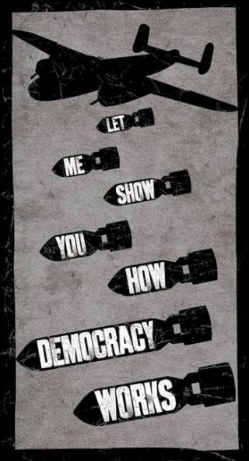 When a five-star general warns you about the dangers of a growing military, it’s probably a good idea to listen. In President Dwight D. Eisenhower’s farewell address to the nation more than 50 years ago, he gave a stark warning. After all these years, it’s clear that few people paid attention.
When a five-star general warns you about the dangers of a growing military, it’s probably a good idea to listen. In President Dwight D. Eisenhower’s farewell address to the nation more than 50 years ago, he gave a stark warning. After all these years, it’s clear that few people paid attention.
We have a military that’s far too big for what’s needed to defend the United States. We have military personnel spread all over the world. We make commitments to defend other countries and base our military in them. All of this comes at a tremendous cost to the American taxpayer. What’s just as bad is that having a powerful military creates the urge to use it, so it leads us into wars that are costly in dollars and in the lives of people around the world.
If Democrats and Republicans don’t come to a budget deal, the military is going to face $600 billion in cuts over the next 10 years. (It’s important to remember that it’s not all at once. Frankly, those cuts will almost certainly never happen.)
But the leaders of the military are in a panic. For instance, on Wednesday, the Army’s chief of staff said those threatened cuts “would cause a hollowness — a significant hollowness in the force.” Military leaders have been lobbying Congress to do pretty much anything to stop those cuts. They’re united in telling us that they don’t have enough money and that they can’t spare a nickel.
At the same time the military is saying it can’t afford to cut its spending, I observed something that suggests otherwise. It’s just a small example, but it’s indicative of a culture in which spending money isn’t a big deal — because there’s always more where that came from.
Two Army helicopter pilots were sent on a mission that even they thought seemed insane. Their commanders were preparing a plan for what to do in the event the base had to be evacuated. Someone suggested that a particular airport 900 miles away might be a good place, but the brass needed to know whether that airport could accommodate 65 helicopters in an emergency. So what did the brass do?
Two pilots were sent in a helicopter to the airport — 900 miles away to ask this question. They got to the airport and landed. They found the appropriate person to ask whether there was space for the aircraft in the even of an evacuation. They were told there wasn’t any room. The whole thing might have taken 10 minutes — but they used 350 gallons of fuel each way to ask in person for the information — instead of someone making a phone call.
The story gets sillier. The helicopters are designed to operate with the windows removed or in place. When the pilots got ready to leave the next morning — after taxpayers put them up in a hotel and paid for their meals at local restaurants — they noticed the latch on a window had a problem. They could have just strapped the window to a seat and flown home, but procedure called for them to report the problem to their superiors. Instead of being allowed to fly home, they were told to wait another night so someone from a military contractor could fly from their base and repair the latch — for the window that they didn’t even need in order to fly.
This is just a tiny thing, but it happened to someone I know. It’s one thing to have your eyes glaze over when you read about trillion-dollar military spending. It’s another thing to see first-hand just how wasteful the military bureaucracy has become. Isn’t this always what happens when you have a large monopoly organization with few constraints on its behavior?
I don’t mean to imply, though, that we should cut the military simply to cut out waste. We should cut the military so we can quit killing people in wars against countries that haven’t attacked this nation. The huge U.S. military is too big a temptation for power-hungry politicians to invent excuses to go to war. They’ll lie to you — as the Bush administration lied about Iraq — and they will ignore their repeated failures afterwards.
 Through it all, they will implore you to ignore the bodies that pile up. Thousands of American troops will die. And tens of thousands of people in the invaded countries will die. You’re supposed to ignore the children killed in this mayhem. And then when the angry local people fight back against the soldiers who have invaded their country, you’re supposed to call those people terrorists.
Through it all, they will implore you to ignore the bodies that pile up. Thousands of American troops will die. And tens of thousands of people in the invaded countries will die. You’re supposed to ignore the children killed in this mayhem. And then when the angry local people fight back against the soldiers who have invaded their country, you’re supposed to call those people terrorists.
If another country invaded the United States — let’s say China — and then occupied it for years and said it would withdraw once it was satisfied that the government was set up as it wanted, how would you feel? How would you like it if they killed hundreds of thousands of us — and said, “Oooops,” each time it happened? Would you think these were kind and peaceful invaders? Or would you hate them and fight back?
For many reasons, it’s time to greatly slash the size of the U.S. military. It’s time to shut down foreign bases and bring those troops back home. It’s time to quit paying to defend other countries. It’s time to let U.S. taxpayers quit paying to maintain armies, navies and warplanes around the world.
Eisenhower was right. The vast military-industrial complex is a hungry monster. Defense contractors want your money. They will tell you it’s good because it “provides jobs.” But ask yourself whether building machines of war is supposed to be about defending this nation or about being a jobs program.
I grew up as a big supporter of the military. I even toyed with the idea of going to one of the service academies. A lot of very good people are employed by the military. (No, I don’t use the word “serve.” They’re employed.) But the fact that good people have been sucked into a system that’s become monstrous isn’t an excuse to keep it. In fact, it’s all the more disturbing because I do respect and care for a lot of individual people in the military.
Politicians and military leaders are going to try to scare you into continuing to spend huge sums of money. I want a very strong defense, but the word “defense” has nothing to do with invading places such as Iraq or Serbia or Iran (which might be next on the list).
It’s time to cut the size of the war machine and bring home the U.S. military personnel stationed around the world. And it’s time for taxpayers to quit paying for this useless and destructive spending.
Note: I highly recommend the documentary, “Why We Fight,” which takes a look at the military-industrial complex and starts with parts of Eisenhower’s speech. You can watch the entire documentary below. If you have any interest in military or defense issues, you need to see this.
 FRIDAY FUNNIES
FRIDAY FUNNIES Flawed bricks can build our lives, because perfection never arrives
Flawed bricks can build our lives, because perfection never arrives